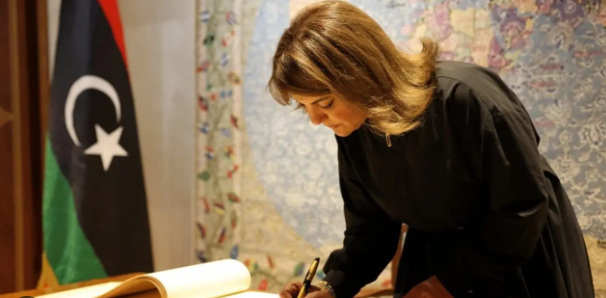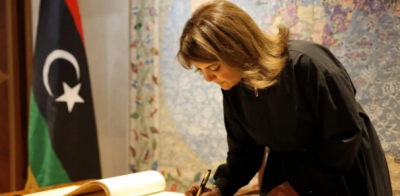Libyan armed forces have intensified their security presence in the capital, Tripoli, today, Friday, to prevent any further protests related to the interim government's meeting with Israel last week. Journalists from Reuters reported that dozens of military vehicles, some equipped with heavy weapons, lined the main roads and traffic intersections while convoys affiliated with powerful armed factions patrolled the city.
This security presence follows calls from activists for new protests against the interim National Unity Government and Prime Minister Abdul Hamid Dbeibah due to the meeting between Foreign Minister Najla Mangoush and her Israeli counterpart. Omar Tarban, head of the Al-Baltres youth movement, stated that during the protests that erupted on Sunday, Monday, and Tuesday evenings, security forces in Tripoli arrested more than 16 demonstrators. He added that most of them will be released tomorrow, Saturday.
The arrests and the intensified security presence today highlight the increasingly precarious situation of the National Unity Government amid coordinated efforts from Libyan factions to replace it with a new administration. In a notable shift last week, the UN envoy stated that forming a unified government is a prerequisite for conducting elections in Libya, altering his previous stance that national elections should occur without changing the administration.
Libya has not experienced significant peace or stability since the NATO-backed uprising in 2011, and it became divided among warring factions in 2014, with two rival governments and parliaments vying for power. Major combat ceased in 2020, but the political process aimed at unifying Libya and holding elections halted due to the eastern-based parliament and other segments of the political system rejecting the legitimacy of the National Unity Government.
Powerful armed factions in Tripoli continued to support Dbeibah and prevented a rival government appointed by the parliament from assuming its duties in the capital following a one-day clash last year. However, clashes that occurred last month between the factions allied with Dbeibah in Tripoli highlighted the risk of escalating hostilities if a stable political settlement is not reached.
Anger against Dbeibah and the National Unity Government erupted late on Sunday when Israeli Foreign Minister Eli Cohen stated that he met with Libyan Foreign Minister Najla Mangoush in Rome to discuss future cooperation. Libya does not recognize Israel and supports the establishment of a Palestinian state with Jerusalem as its capital. Following protests in several cities and expressions of anger from various Libyan political factions, Dbeibah dismissed Mangoush. Youth Minister in the National Unity Government, Fathallah Al-Zani, said yesterday that he rejected the appointment.
Dbeibah stated in the cabinet meeting yesterday that he rejects any normalization with Israel and that the realities of Mangoush's meeting with Cohen would necessitate a harsh "response," though he did not deny knowing about it specifically. Analysts say that Dbeibah and other Libyan leaders have attempted to build relations with Israel in hopes that the United States would support them in the internal political crisis in Libya. Normalization between Arab countries and Israel is one of Washington's priorities.




